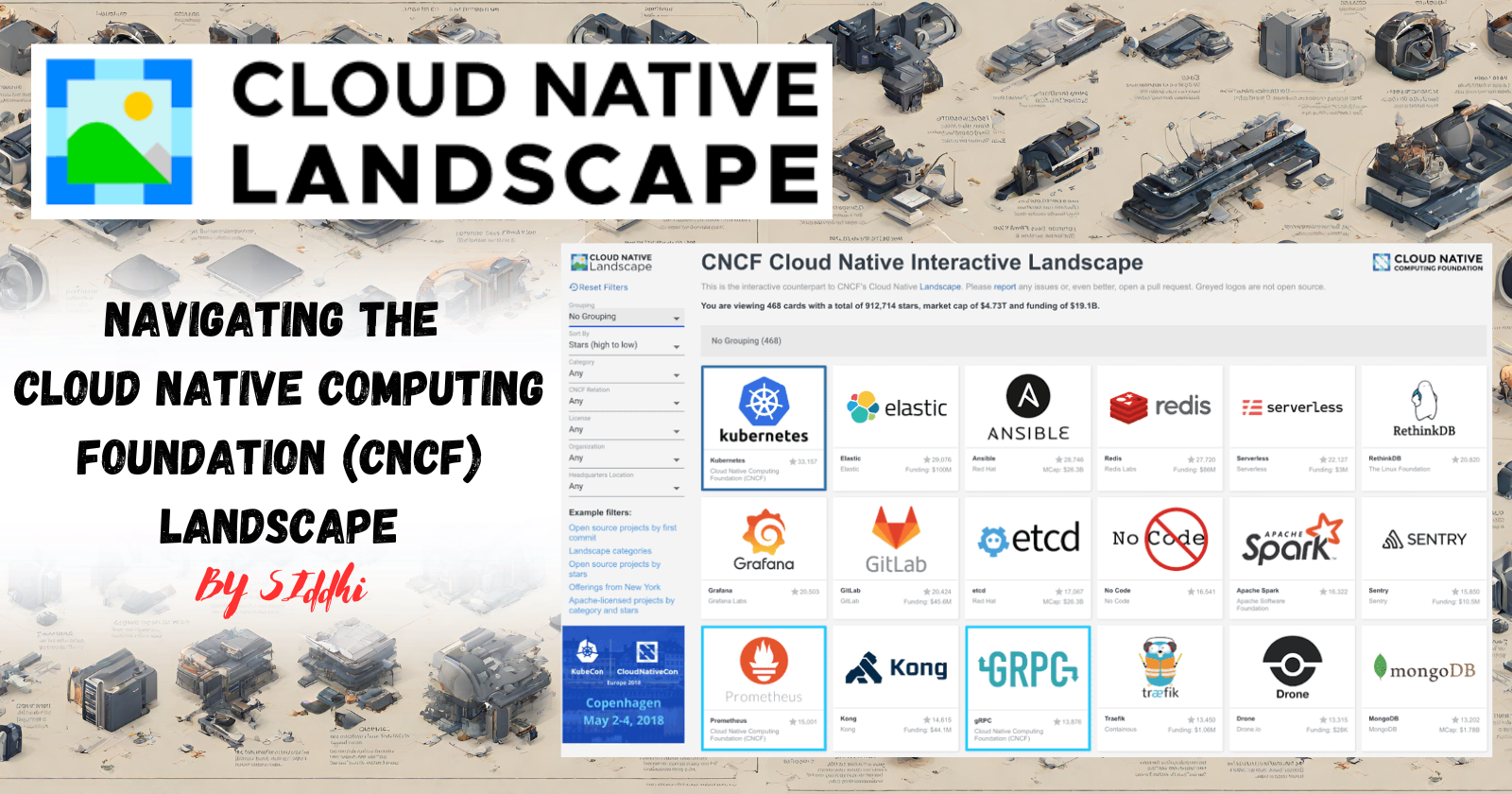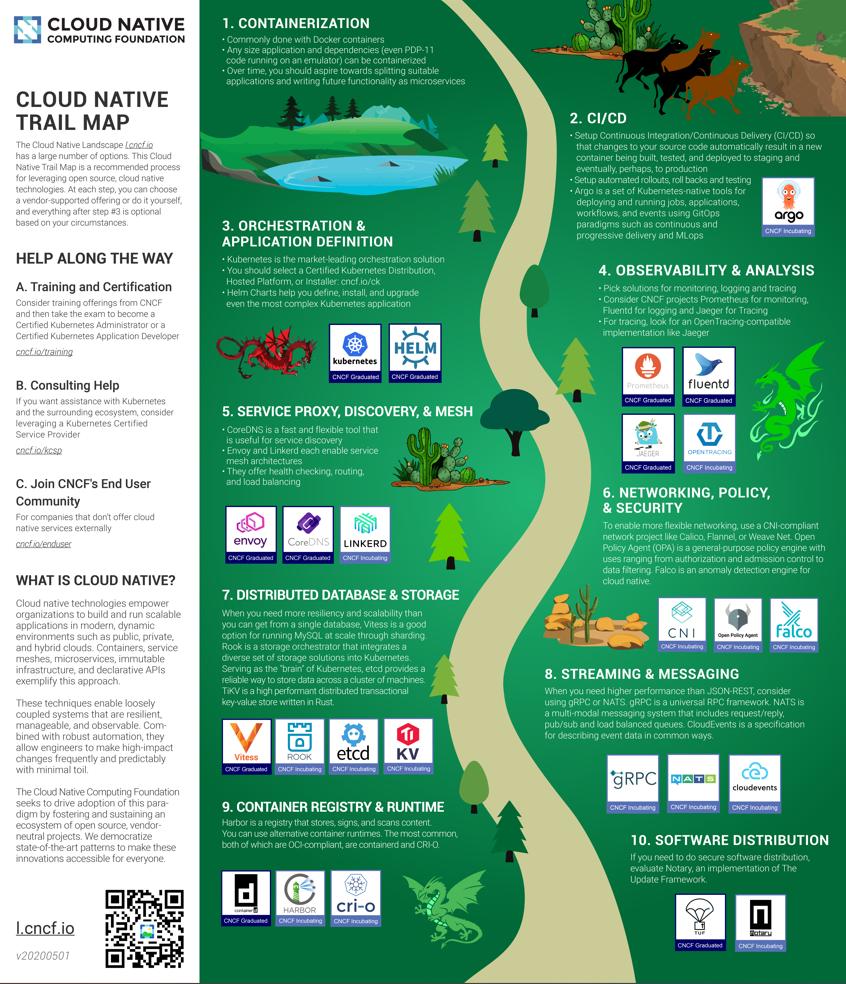Navigating the Cloud Native Computing Foundation (CNCF) Landscape
 SIDDHIPRADA MOHAPATRO
SIDDHIPRADA MOHAPATRO
Introduction
In the fast-evolving world of cloud-native technologies, the Cloud Native Computing Foundation (CNCF) stands as a beacon of innovation and collaboration. With a mission to nurture and drive the adoption of cloud-native computing, the CNCF hosts a vibrant ecosystem of projects, tools, and resources that cater to the ever-growing demand for scalable, resilient, and efficient cloud-native applications. In this comprehensive overview, we'll explore the CNCF landscape, understand its core principles, and delve into some of the key projects and initiatives it fosters.
Understanding Cloud Native Computing
Before we dive into the CNCF landscape, let's clarify what cloud-native computing means. Cloud-native refers to a set of practices and technologies that enable organizations to build and run scalable applications in modern, dynamic environments, such as public, private, and hybrid clouds. It emphasizes containerization, microservices architecture, continuous integration and continuous deployment (CI/CD), and dynamic orchestration. The key attributes of cloud-native applications include scalability, resiliency, agility, and efficiency.
The CNCF's Role
The CNCF serves as an open-source software foundation under the umbrella of the Linux Foundation. Its primary objectives are:
Fostering Innovation: CNCF provides a collaborative environment where developers, users, and industry leaders can work together to advance cloud-native technologies.
Vendor Neutrality: It ensures that projects and initiatives are vendor-neutral, promoting open standards and interoperability.
Promoting Best Practices: The CNCF shares best practices, patterns, and guidelines to help organizations transition to cloud-native architectures.
Certification and Training: The foundation offers certification programs and training resources to validate and enhance cloud-native skills.

CNCF Landscape Overview
The CNCF landscape is a rich and diverse ecosystem consisting of several key components:
Projects: CNCF hosts a variety of open-source projects that span the cloud-native landscape. One of the most prominent projects is Kubernetes, a container orchestration platform that automates the deployment, scaling, and management of containerized applications.
End-User Communities: These communities provide valuable feedback, real-world use cases, and insights, ensuring that CNCF projects meet practical needs.
Working Groups: Working groups focus on specific areas such as storage, observability, and security, advancing standards and best practices within those domains.
Events: CNCF organizes events like KubeCon and CloudNativeCon, which gather cloud-native enthusiasts, professionals, and experts to share knowledge and experiences.
Certification: CNCF offers certification programs for Kubernetes, ensuring that professionals have the skills to manage containerized applications effectively.
Key CNCF Projects
Let's delve into some of the pivotal projects hosted within the CNCF landscape:
Kubernetes: As the flagship project, Kubernetes revolutionized container orchestration, providing a robust platform for automating application deployment and scaling.
Prometheus: An open-source monitoring and alerting toolkit that helps organizations gain insights into the performance and health of their applications.
Envoy: An edge and service proxy that enhances the resilience and observability of cloud-native applications.
Fluentd: A data collection and unified logging layer that simplifies the collection, parsing, and distribution of log data.
Helm: A package manager for Kubernetes that simplifies the deployment and management of applications.
Containerd: An industry-standard core container runtime that manages the container lifecycle on a single host.
Jaeger: A distributed tracing system that aids in understanding and optimizing the flow of requests within complex, microservices-based applications.
CoreDNS: A flexible, extensible DNS server that simplifies service discovery within containerized environments.
CNCF Project Stages and Graduation
CNCF projects go through various stages on their journey to maturity within the landscape. These stages include:
Incubating: Projects in this stage are actively evolving, gaining contributors, and expanding their feature set.
Sandbox: Projects in the sandbox stage are experimental and exploratory. They are early-stage projects exploring new ideas and technologies.
Graduated: Projects that have reached the graduation stage are mature, stable, and widely adopted. These projects represent the cream of the crop in the CNCF landscape.
CNCF Trail Maps
In addition to launching the Cloud Native Landscape 2.0 version, the CNCF also released the Cloud Native Trail Map, which provides an overview for enterprises starting their cloud-native journey.
While there are innumerable routes for deploying a cloud-native application, CNCF Projects represent a particularly well-traveled, tested and trusted path.

Wrap-Up
The Cloud Native Computing Foundation (CNCF) plays a pivotal role in driving the adoption of cloud-native technologies by hosting a diverse array of projects, resources, and communities. It fosters innovation, encourages best practices, and ensures vendor neutrality. As organizations increasingly embrace cloud-native principles to build and scale applications, the CNCF landscape continues to evolve, providing the tools and knowledge needed for success in the cloud-native world. Whether you're a developer, a technology enthusiast, or an industry professional, the CNCF is the place to be for exploring the future of cloud-native computing.
😊 Thank you so much for reading my blog! 😊 I hope you found it helpful and informative. If you did, please 👍 give it a like and 💌 subscribe to my newsletter for more of this type of content. 💌
I'm always looking for ways to improve my blog, so please feel free to leave me a comment or suggestion. 💬
Thanks again for your support! 😊
Subscribe to my newsletter
Read articles from SIDDHIPRADA MOHAPATRO directly inside your inbox. Subscribe to the newsletter, and don't miss out.
Written by

SIDDHIPRADA MOHAPATRO
SIDDHIPRADA MOHAPATRO
● A DevOps Engineer with practical experience in production monitoring, automation, and optimization. ● Created UNIX shell scripts for day-to-day check-outs and added them to the crone (which saved the manual work for 1 Hour per day). ● Have experience automating the building, deploying, and releasing of code from one environment to another through the use of DevOps engineering and Build and Release. ● YAML proficiency. ● Understanding of the Python programming language, Matplotlib, pandas, and tkinter (GUI). ● knowledge of Github and the GIT (version control system).